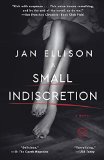Below is a short Q&A with the author of A Small Indiscretion, Jan Ellison.


Created: 02/08/16
Replies: 5
Join Date: 10/15/10
Posts: 3442
Join Date: 10/15/10
Posts: 3442
When I was nineteen, I took a year off college. I spent three months in Paris, then moved to London and checked into a youth hostel. On my birthday, I called my mother from an iconic red phone booth. This was before cell phones and the Internet, and when we'd hung up, I realized there was no way she nor anyone else could reach me. I found that idea exhilarating. Two decades later, when I sat down to write what became A Small Indiscretion, it was simply that feeling I was trying to capture--the heady, lonely liberty of that moment in life when you can choose to become anyone at all.
Join Date: 10/15/10
Posts: 3442
It's not easy for Annie to give up that sense of liberation and possibility she feels when she first arrives in London. Yet later, it seems unthinkable for her to turn away from keeping her children safe in the world, or to compromise the marriage that is the bedrock of those children's lives. This paradox confounds Annie-- and fascinates me.
Freedom is intoxicating. Marriage and parenting can feel suffocating. The burdens of family life are also precious, though; they are blessings we both celebrate and resist. We make our peace, then fight it. We make mistakes, and we make amends. And if we're lucky, we carry on to treasure the laden, harried, unremarkable days, the blessed, barely observed constructions that are our adult lives.
Join Date: 10/15/10
Posts: 3442
I was not conscious of making a choice to write the book in this form; I simply found that one day, after years of work, the narrative shifted, and Annie was writing to her son. That was the day Robbie entered the novel, offering Annie's history shape and purpose. This structure arrived organically, and I never considered altering it.
It was only later that I understood Annie's intent. "Sometimes I try not to think of you. Or at least I try not to worry. But I am superstitious; it might be when I fail to worry that you will slip away for good." Annie addresses Robbie because it allows her to imagine him healthy and whole. Writing "to him" is her antidote for despair. As a parent, vigilance can be your only recourse. To look away, to let silence rise between yourself and the child in your care, is to risk letting that child go. But ultimately, Annie's "barely legible revision" is not for Robbie at all; it is her "own tangled attempt to finally see the past and let it rest."
Join Date: 10/15/10
Posts: 3442
I dabbled in writing before I became a mother, but it was only after the second of our four children was born that I quit my job and signed up for my first writing class. The two preoccupations have always gone hand in hand, and in the beginning, I couldn't work it out: Was I meant to feel guilty when I was writing, or when I was not writing? When I was abandoning my children and shirking off my domestic duties or when I was tossing aside what might turn out to be my only talent?
In the bulk of the hours and days of those early years, I was immersed in the physical act of mothering. The writing was a guilty retreat, the thing I'd slink off to furtively, greedily, as if to a lover. Two or three times a week for a few hours in a café. Or on a Saturday morning, while my husband watched four kids under the age of 8. When the novel was nearing completion, my mother swooped in again and again to take over my household while I fled to the mountains to finish it.
Leaving my children to write has seemed a kind of madness over the years, but it would have been a different kind of madness not to write--one that might, in fact, have driven me insane.
Join Date: 10/15/10
Posts: 3442
There isn't much I could say to my twenty-year-old self she wasn't already telling herself--then systematically ignoring. "All in good time," for instance. "Everything in moderation." These were the mantras I whispered then ignored as I rushed forward, grabbing everything at once and wildly seeking oblivion. Once, I was sitting on a beach in New Zealand, at night, eating a hamburger, when a ski boat motored up and idled just a few feet off shore. There were men in the boat. One of them called out to me, asking if I wanted to go for a ride. "Sure," I said. "Why not?" I was twenty-two by then. I ought to have known better. But I took off my shoes, rolled up my jeans, and waded out. Many hours later, I was in the back of a cab alone--drenched, freezing, miserable--trying to get back to where I'd started.
But is there really so much room for regret? You can't be a person you're not, and you can't know the meaning of a story until you've gotten to the end of it. And my 20-year-old self taught me a few things I haven't forgotten: How to look at the world around me and take notes; how to leap joyfully into the unknown; how to retrace my steps when I've taken a wrong turn and find my way back--wet, cold, and wiser.
Reply
Please login to post a response.